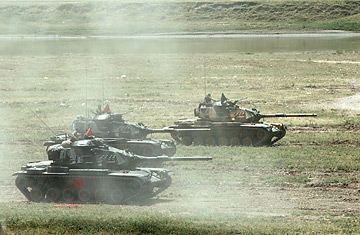
Turkish soldiers on maneuvers near the Iraqi border in June.
The simmering conflict between Turkey and Kurdish guerrillas headquartered in neighboring Iraq may be getting close to a boil. On Sunday, after 13 Turkish soldiers were killed by rebels, the government in Ankara announced that it had shelled suspected hideouts of the Kurdish Workers Party (PKK), which wants some form of Kurdish self-rule in southeast Turkey. It was the worst number of casualties sustained by the Turkish army in nearly a decade. Just a week ago, a minibus was ambushed by suspected Kurdish rebels, killing 13 people, including a seven-year-old child.
Under mounting public pressure, Turkey's government is mulling a cross-border military operation into Iraq to pursue the Kurdish separatist rebels based there. Prime Minister Recep Tayyip Erdogan has so far withstood military pressure to authorize such a move, but with 26 people killed in two recent attacks, public calls for retaliation are growing. The top-selling daily Hurriyet ran a banner headline Monday saying, "This warrants going into [Iraq]." Opposition politicians on both left and right have accused the government of failing to respond to the increased violence.
Erdogan and the Turkish military rarely see eye to eye. The country's powerful generals are suspicious of Erdogan and his Justice and Development Party, which they suspect of secretly harboring an Islamist agenda. In May, Erdogan and army chief Yasar Buyukanit clashed after Erdogan refused to authorize a request by the military to approve a cross-border operation against the PKK.
But the scale of recent attacks and the public outcry could make this different. On Sunday evening, Erdogan pledged to fight "a very different kind of war" against Kurdish rebels, suggesting that he might now send troops into Iraq to crush PKK rebels based there. The government's anti-terrorism task force is due to meet Tuesday to decide a course of action. "We will take certain steps based on the outcome of that meeting," said Erdogan.
But even if Erdogan gave Turkey's military the green light, going across the border has its problems. The PKK bases in northern Iraq are deep in the mountains, a long way from the Turkish border. The PKK forces are in the remote Qandil Valley near Iran, and the Turkish army would have to penetrate deep into Iraq and travel through several Iraqi cities before reaching it. By that time the PKK's mobile guerrilla units would have most likely have snuck away to fight another day. And even if the Turkish air force got U.S. permission to cross into Iraq, air strikes have a limited effect on a guerrilla insurgency. Additionally, the attacks against Turkish military and civilians were apparently perpetrated by PKK operators within Turkey.
Late last month the Turkish and Iraqi governments agreed on a series of measures to crack down on the activities of the PKK, which maintains training camps in Kurdish-controlled northern Iraq. But the Turkish military is still unhappy with the agreement because it does not allow for "hot pursuit" — permission for the Turkish military to follow PKK fighters who cross the border into Iraq. Turkey says about 3,000 PKK fighters are based in north Iraq and it has accused Iraqi authorities of tolerating their presence. The U.S., keen to avoid any conflict in Iraq's only relatively stable region, has tried to contain Turkish frustration over the steady trickle of casualties in southeastern Turkey by backing Turkish-Iraqi talks.
The reality is that there is no effective military solution for the PKK. The Iraqi government may make a show of cooperating with the Turks, but the Iraqi army can't even keep Baghdad safe, let alone mount an expedition in northern Iraq. Northern Iraq isn't even in the Iraqi central government's military jurisdiction. There are no federal Iraqi soldiers there — just Iraqi Kurdish militia units (the peshmerga) controlled by the largely autonomous Kurdish Regional Government (KRG).
Furthermore, Iraq's Kurdish leaders have repeatedly said they aren't about to send their soldiers off on a treacherous struggle with hardened guerrilla fighters in difficult terrain. Iraq's Kurds fought the PKK once before in the 1990s, and they're not looking forward to repeating the ugly experience. Plus, the Iraqi Kurds say their peshmerga are already stretched thin. Besides keeping Arab terrorists out of the KRG, peshmerga are also helping the Iraqi army in Mosul and Baghdad.
